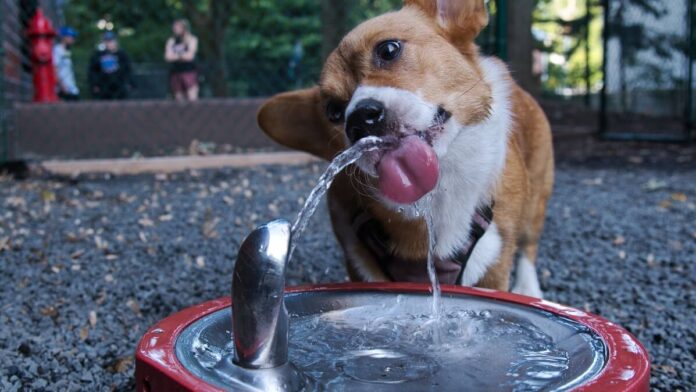In the bustling dog parks of Sydney, a seemingly harmless fixture could pose a deadly threat to our beloved canine companions. The communal water bowl, a staple in many parks, has become a potential source of a rare but fatal bacterial disease known as leptospirosis.
This disease, which can be transmitted through rat urine, has seen a resurgence in Sydney following a years-long vaccination shortage that has left thousands of pets vulnerable.
Leptospirosis is caused by bacteria that can thrive in stagnant water for months, even surviving freezing temperatures. When dogs are infected, they may exhibit symptoms such as fever, vomiting, lethargy and, in severe cases, kidney failure. During recent outbreaks, the mortality rate for affected dogs has been alarmingly high, reaching 88 per cent.
The situation has been exacerbated by a manufacturing crunch that hit the two vaccine companies supplying Australia. The shortage began when the NSW supplier, Boehringer Ingelheim, experienced inconsistent supply in 2022, which ceased entirely in July 2023.
Matters worsened in November when Treidlia Biovet, the manufacturer of the vaccine used in Queensland, recalled four batches due to a suspected anaphylactic reaction in a dog post-immunisation.
A long-awaited delivery of the NSW vaccine is now being distributed, but supplies are expected to run out quickly. Vets are working hard to catch up with the backlog of vaccinations, but the demand is overwhelming.
Dr Sam Haynes, owner of Sydney Animal Hospitals, says he is managing a waitlist of 5000 dogs needing vaccination.
Boehringer Ingelheim has confirmed that vaccine supply is improving, with additional shipments expected in the coming months. The goal is to achieve a reliable and full supply by the second half of 2024.
Significant outbreak
Leptospirosis was not reported in Sydney from 1976 until a dog in Haymarket contracted the disease in 2017. A more significant outbreak began in 2019, affecting various areas of the city. This prompted the City of Sydney to double rat bait stations and the RSPCA to offer free vaccines after several dogs died from the disease.
Dr Christine Griebsch, an expert in animal medicine at the University of Sydney, began tracking the disease, noting that increased rodent movement due to major construction could be a contributing factor.
Overseas researchers had seen cases spike after heavy rainfall and flooding, Dr Griebsch told The Sydney Morning Herald. However, the link between cases and weather patterns in Australia is not yet clear.
Dog owners are advised to prevent their pets from drinking from puddles, or ponds that could be contaminated with rat urine. The risk of infection may be low, but the consequences are severe and often fatal.
“Communal dog water bowls as well could be a source of infection,” Dr Griebsch said.
Leptospirosis symptoms:
- lethargy, reluctance to move
- loss of appetite
- vomiting and diarrhoea
- fever
- jaundice (yellowing of the eyes and gums)
- breathing difficulty
- liver and kidney failure.
Be aware symptoms are non-specific and may appear as other illnesses.
What you can do
Always ensure your dog’s vaccinations are up to date and be vigilant about where they drink from when out and about.
Invest in a portable water bottle with an attached drinking nozzle or carry a collapsible bowl during outdoor excursions. Not only does this mitigate the risk of disease transmission and social stress, but it also allows you to monitor your dog’s water intake more effectively. Remember, hydration is paramount to your dog’s health and happiness, so don’t compromise their wellbeing for the sake of convenience.
Have you encountered any issues obtaining vaccinations for your pet? Do you have concerns about communal water bowls? Share your experiences and tips for keeping your pets safe in the comments below.
Also read: Dog breed or dog owner? Who’s to blame for injuries?

